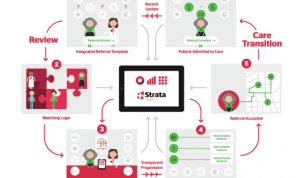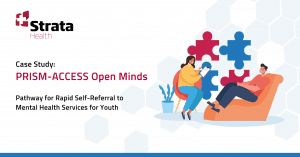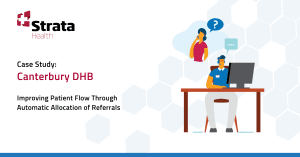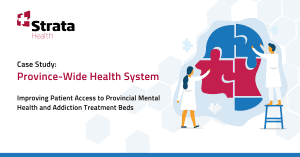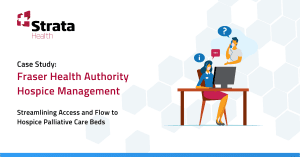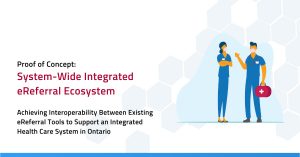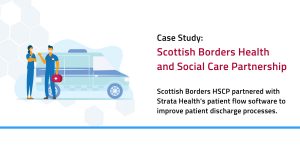
The Background
Fraser Health delivers hospital and community-based health services to over 1.9 million people in 20 diverse communities across British Columbia, Canada. Supporting this population are over 80 funded long-term care homes that admit over 3000 clients in any given year.
During the COVID-19 pandemic, along with the rest of the country, Fraser Health’s 12 acute care hospitals and staff were under significant pressure. With many beds occupied by alternate level of care (ALC) long-term care patients, there was a clear consensus: the timely discharge and placement of long-term care patients could help expand acute-care capacity.
The Goals
To achieve this, Fraser Health’s Integrated Long-Term Care and Assisted Living team set clear goals and objectives, which included:
- Identifying where and why access and flow bottlenecks were occurring
- Developing solutions and aligning partners in acute and community care to make both necessary and timely changes
- Promoting a culture of resident-centred care to improve the patient experience
- Establishing and monitoring a range of key metrics and performance indicators (KPIs) to inform decision making and track progress
The Solution
Fraser Health began analyzing and interpreting data available through Strata Health’s Transitions of Care Software, Strata PathWays, to establish a performance baseline for its, then, current placement process. This also gave the team a clear understanding of the impacts of its changes and helped it measure and monitor its progress.
The team’s initial analysis uncovered two high-level desired outcomes:
- Reduce the eligibility assessment required long-term care (EAR-LTC) length of stay;
- Reduce the alternative level of care long-term care (ALC-LTC) length of stay.
Tightening the transition time for clients moving from acute care required work across the health authority. The team undertook many improvements, most notable of which was expanding bed matching, acceptance and transition to a seven-day-a-week process. They also worked to improve processes within the department using a lean six sigma approach and rigorously monitored vacant and closed beds which were key contributors to ALC-LTC lengths of stay.
The team also worked in close collaboration with care communities to better meet residents’ needs and focused on promoting a resident-centred approach to transitions and placement across the system.
The team identified problems proactively and worked together with the appropriate stakeholders to address any barriers to their work. With each iterative change, it continued to monitor the data to measure impacts and inform next steps.
“Meaningful change in the healthcare system requires a deep understanding of baseline data and the ability to measure the impact of the changes you make. Strata PathWays enabled us to measure and track the metrics that matter, informing better decisions and ensuring that we’re responding to system pressures in real-time.”
Angela Mitchell
Director, Access, Care & Transitions
Fraser Health Authority
The Results
From January – December 2021, Fraser Health transformed the process for clients referred to long-term care and achieved the below outcomes:
- Reduced EAR-LTC length of stay by 2.3 days
- Reduced ALC-LTC length of stay by 6.8 days
- Increased weekend moves by 27%
- Reduced closed long-term care beds by 89%
- Contributed tens of thousands of incremental hospital bed days available to clients requiring acute care
Learnings & Next Steps
Throughout the process of transformative change, the team had many learnings and recommendations for health authorities looking to make similar changes.
- Ensure there is technology in place to measure key process steps
- Identify key performance metrics for improvement based on current state
- Identify areas for improvement based on current state data
- Create and promote a resident-centred culture
- Continue to measure performance metrics throughout the change to ensure objectives are being achieved
- Coach stakeholders to leverage data as part of their day-to-day activities
Fraser Health is now working with Strata Health to launch an action-oriented dashboard that will help further streamline daily tasks and priorities for stakeholders in the long-term care placement process.
*All data reported represent change from 2019 to 2022.
Start improvements with Strata Health
With tools to streamline every part of your placement process and a support team excited to help, transitions of care with Strata Health have never been easier. Contact us to learn more or book a demo. Contact us today!












